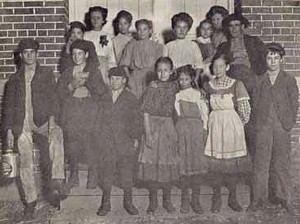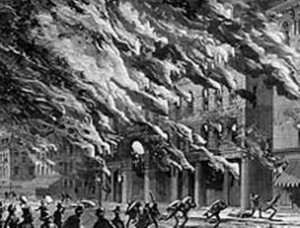 I have been reading my Great Aunt Bertie Schumacher’s journal for a while now, and every time I pick it up I find something new. She started her journal by talking about how any writer can become famous in time, simply by observing the events around them and writing about those events, how they made people feel, and what happened because of those events. As a writer myself, I began to think about what she said, because there really is a vast difference, I think, between a writer and a reporter. A reporter simply tells the events as they happened, but a writer elaborates on the events, the people involved, and their feelings. There are reporters who are writers, obviously, but I think it would be very hard for a writer not to interject their thoughts and feelings into a report.
I have been reading my Great Aunt Bertie Schumacher’s journal for a while now, and every time I pick it up I find something new. She started her journal by talking about how any writer can become famous in time, simply by observing the events around them and writing about those events, how they made people feel, and what happened because of those events. As a writer myself, I began to think about what she said, because there really is a vast difference, I think, between a writer and a reporter. A reporter simply tells the events as they happened, but a writer elaborates on the events, the people involved, and their feelings. There are reporters who are writers, obviously, but I think it would be very hard for a writer not to interject their thoughts and feelings into a report.
Aunt Bertie wanted to tell a little bit about the things that were going on in their time. Still, she could not help but put into words how she felt about the events of the day. She mentioned that the first Kindergarten was formed in 1873. At that time there were only about 200 high schools in the entire country, but by 1900 there were 6000, along with colleges that were heavily endowed by the Rockefeller, Stanford, and Vanderbilt families. Fisk College for “blacks” came into being. Women were coming to the foreground. Football became a part of college life. You could become a doctor in four months…later it took three years, and we all know it takes much longer now. At that time, 98% of children were in the grades. Aunt Bertie mentions that it was thought that education was a cure all. Authors like Emily Dickinson, Bret Hart, and Mark Twain tried to enrich the world. There were streetcar and yacht races, P.T Barnum Circus, Dwight Moody held mass revivals, and McGuffy’s Reader taught moral lessons. And then she tells about the thing that bothers her the most, when she said, “But all this did not abolish CHILD LABOR!”  It seemed to Aunt Bertie that there were so many changes that the nation was seeing, but the one thing that appalled her the most at the time, was still there, and still endangering the lives of children. It was so hard for her to imagine that with everything else moving with such monumental steps toward a more modern civilization, that was so much more educated, that no one could stop child labor. In fact it seemed to her that no one noticed it, or even cared at all.
It seemed to Aunt Bertie that there were so many changes that the nation was seeing, but the one thing that appalled her the most at the time, was still there, and still endangering the lives of children. It was so hard for her to imagine that with everything else moving with such monumental steps toward a more modern civilization, that was so much more educated, that no one could stop child labor. In fact it seemed to her that no one noticed it, or even cared at all.
Her writings picture disasters, such as the panic in 1873, at the height of the reconstruction of the 1870’s…widespread unemployment, bankruptcy of many people, and failure of businesses, the Great Chicago fire and fires in Wisconsin, Boston, and other places that caused the failure of Insurance Companies who did not have enough Reserves to cover all of these disasters, railroad strikes and violence. Then she mentions what she terms “the sins of society”, one million people living in New York slums…ten to fifteen people in three rooms. The thought of so many people being forced to live in such appalling conditions tore at Aunt Bertie’s heart. Somehow, these things just should not be, and yet this was the world we were living in at that time.
Aunt Bertie wanted to tell about the things that were changing in our world, and how many improvements those changes were making to the world, but her tender heart just couldn’t get past the horrible injustices she could still see. There are lessons to be learned from her writings. Lessons of compassion, kindness, charity, and love for our fellow man. All too often we are so busy working on the improvements we want to make in our lives, society, and our  world in general, that we forget about how those things could affect the lives of others. The greed of the factory owners could not see past the profit to what their child laborers were suffering. Many changes have come from the horrors of the past. Child labor laws now protect our children, and as an insurance agent, I know that companies must hold enough in reserve to cover disastrous losses, and that while no insurance company is completely safe from failure, there is far less chance of it these days because of those reserves. While those days and events tore at Aunt Bertie’s tender heart, maybe society wasn’t totally deaf to the plight of the people after all.
world in general, that we forget about how those things could affect the lives of others. The greed of the factory owners could not see past the profit to what their child laborers were suffering. Many changes have come from the horrors of the past. Child labor laws now protect our children, and as an insurance agent, I know that companies must hold enough in reserve to cover disastrous losses, and that while no insurance company is completely safe from failure, there is far less chance of it these days because of those reserves. While those days and events tore at Aunt Bertie’s tender heart, maybe society wasn’t totally deaf to the plight of the people after all.


Leave a Reply